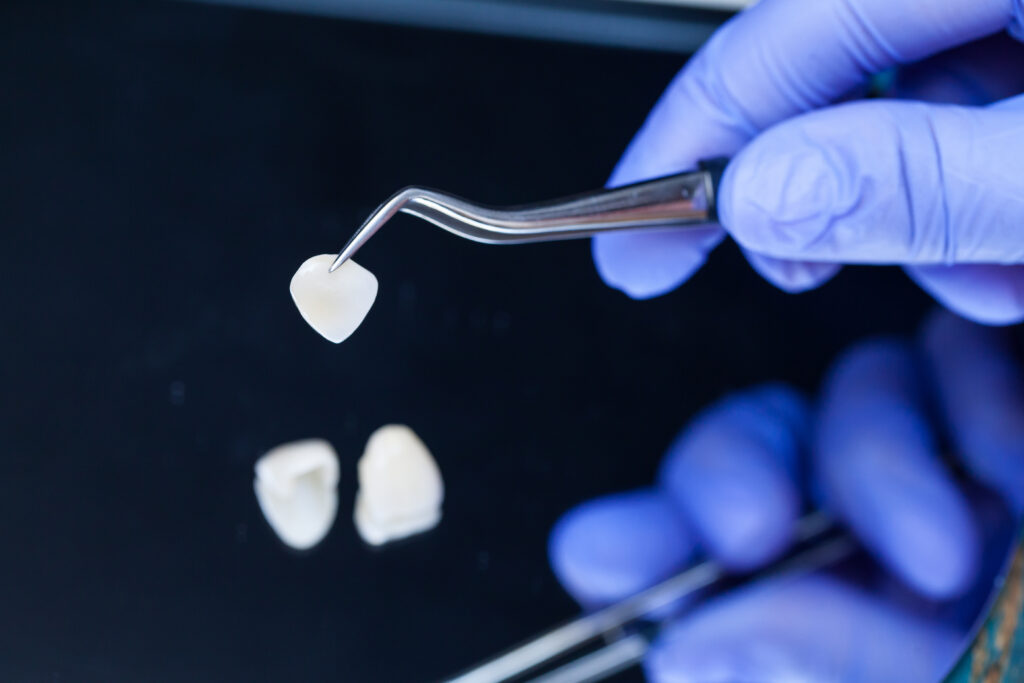
Veneers can transform discoloured, chipped, or misaligned teeth into a picture-perfect smile, boosting both confidence and appearance. However, with different types of veneers available, it can be challenging to decide which type is best for you.
Benefits of Dental Veneers
Dental veneers offer numerous benefits that go beyond simply improving the appearance of your teeth:
Natural Tooth Appearance
- Custom-made to match the colour, shape, and size of your existing teeth
- Ensures a seamless blend with your smile
- Great for achieving a natural and aesthetically pleasing look
Durability
- Thin yet strong shells that withstand everyday wear and tear
- Long-lasting with proper care and maintenance
Protection for Teeth
- Acts as an extra layer of protection for weakened enamels
- Reduces the risk of further decay or damage
- Beneficial for those with enamel erosion due to dietary habits or medical conditions
Minimal Maintenance
- Requires regular brushing, flossing, and routine dental check-ups
- Easy to maintain compared to other cosmetic dental procedures
Porcelain Veneers
Made from high-quality ceramic material, porcelain veneers are known for their strength and durability. They are highly resistant to stains, making them an excellent option for individuals who consume beverages like coffee, tea, or red wine, all of which can stain natural teeth when consumed regularly.
The process of getting porcelain veneers typically involves two or three visits to the dentist. During the first visit, your dentist will take impressions of your teeth and prepare them by removing a small amount of enamel. This is necessary to ensure the veneers fit properly and look natural. The impressions are then sent to a dental laboratory, where the custom veneers are crafted.
Once the veneers are ready, you will return to the dentist for a fitting. The dentist will place the veneers on your teeth to check the fit and colour. Adjustments can be made if necessary before permanently bonding them to your teeth. This process ensures that the veneers look and feel natural in your mouth.
One of the main advantages of porcelain veneers is their longevity. With proper care, they can last anywhere from 10 to 15 years, or even longer in some cases.
Composite Veneers
Composite veneers are another option for individuals seeking to enhance their smile. This type of veneer can be completed in a single visit to the dentist, making it a convenient option for those with busy schedules.
During the procedure, the dentist will apply the composite resin to the surface of your teeth, shaping and sculpting it to achieve the desired appearance. Once the resin is in place, it is hardened using a special light. The dentist will then polish the veneers to give them a natural and smooth finish.
One of the key benefits of composite veneers is their affordability. They are generally less expensive than porcelain veneers, making them an attractive option for individuals on a budget. Additionally, because the procedure can be completed in one visit, there is no need for multiple appointments or temporary veneers.
Choosing the Right Veneer for You
When it comes to choosing the right type of veneer, several factors should be considered. Understanding your goals, thinking long-term, and discussing any queries or concerns with your dentist can help you make an informed decision.
Consider Your Goals
Your personal goals and expectations play a crucial role in determining the right type of veneer for you. Are you looking for a quick fix to enhance your smile for an upcoming event, or are you seeking a long-term solution to improve your dental health and appearance? If you need a temporary solution or are working within a limited budget, composite veneers may be the better option. On the other hand, if you are looking for a durable, long-lasting solution with a more natural appearance, porcelain veneers might be the best choice.
To help yourself with making a decision, it might be helpful to think about the specific issues you want to address with veneers. If you are concerned about staining, porcelain veneers may be more suitable due to their stain-resistant properties. If you need to correct minor cosmetic flaws or achieve a quick transformation, composite veneers could meet your needs effectively.
Think Long-Term
Considering the long-term implications of your decision is essential when choosing between porcelain and composite veneers. Porcelain veneers tend to be more durable and longer-lasting, making them a better investment if you are looking for a permanent solution. While the initial cost may be higher, their longevity can make them more cost-effective over time.
Composite veneers, while more affordable initially, may require more frequent replacements. This could lead to higher costs in the long run. Additionally, the susceptibility of composite veneers to staining and damage should be taken into account when making your decision.
Evaluate your lifestyle and habits when thinking long-term. If you consume staining foods and beverages frequently or have habits that may damage veneers, such as teeth grinding, porcelain veneers may provide better durability and longevity.
Discuss Queries and Concerns with Your Dentist
One of the most important steps in choosing the right type of veneer is discussing your options with your dentist. Your dentist can provide valuable insights based on their experience and expertise, helping you make an informed decision.
During your consultation, be open about your goals, expectations, and any concerns you may have. Ask questions about the differences between porcelain and composite veneers, the procedure involved, and the maintenance required for each type. Your dentist can assess your dental health and recommend the most suitable option based on your specific needs.
Your dentist can also show you before-and-after photos of previous patients who have received veneers, giving you a better idea of the potential results. This can help you visualise how veneers can enhance your smile and make a more confident decision.
How Much Do Veneers Cost?
The cost of dental veneers can vary widely depending on several factors, including the type of veneer, the complexity of the procedure, and the location of your dental practice. On average, porcelain veneers tend to be more expensive than composite veneers due to the materials used and the additional lab work required.
In Singapore, the cost of a single porcelain veneer can range from SGD 1,000 to SGD 2,500. Composite veneers, on the other hand, typically cost between SGD 400 to SGD 1,000 per tooth. These prices can vary based on the dentist’s experience, the location of the practice, and any additional treatments needed.
When budgeting for veneers, be sure to factor in the cost of any preliminary treatments that may be required, such as teeth cleaning, whitening, or minor dental work. Additionally, consider the potential need for future maintenance or replacement, especially if you decide to go for composite veneers.
Smile Makeover in Singapore
If you’re ready to put your best smile forward, then it’s time to think seriously about veneers which can cover any chips, cracks and stains for a pearly white smile. For peace of mind, it helps to have a professional with you to understand and assess your unique oral condition.
At Orchard Scotts Dental, restoring your smile is important to us. If you want to put veneers on your teeth, or know someone who does, contact us today.


